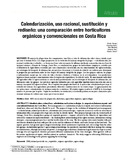| dc.contributor.author | Clavijo, Neidy | |
| dc.contributor.author | Prins, Cornelis | |
| dc.contributor.author | Sánchez Garita, Vera | |
| dc.contributor.author | Soto, Gabriela | |
| dc.contributor.author | Staver, Charles | |
| dc.date.accessioned | 2015-03-19T21:01:21Z | |
| dc.date.available | 2015-03-19T21:01:21Z | |
| dc.date.issued | 2006 | |
| dc.identifier | 471594 | es_ES |
| dc.identifier.issn | 1659-0082 | es_ES |
| dc.identifier.uri | https://repositorio.catie.ac.cr/handle/11554/5849 | |
| dc.description.abstract | El manejo de plagas tiene dos componentes: uno física y otro de información sobre cómo, cuándo y por qué usar el insumo físico. Las etapas propuestas en la evolución del manejo integrado de plagas -calendarización, uso racional, sustitución y rediseño- se basan en el uso cada vez mayor de información frente a una reducción en el uso de insumos externos. Al norte de Cartago, Costa Rica, se estudiaron tres grupos de horticultores (orgánicos, asistidos por el Ministerio de Agricultura y asistidos por casas comerciales) en relación con sus conocimientos del agroecosistema, sus estrategias de búsqueda de información, sus prácticas de manejo y el estado de salud de sus cultivos para determinar la progresión que mostraron entre las tres etapas del manejo integrado de plagas. sistema. Los agricultores presentaron diferentes combinaciones de las cuatro etapas. La gran mayoría aún usa aplicaciones calendarizadas de insumos naturales o sintéticos. El estudio sugiere reenfocar el MIP de la tecnología misma a la persona que la aplica. Según los resultados, la sustitución y el rediseño podrían ser mejores alternativas para alcanzar sistemas de cultivos más sanos que el uso racional. | es_ES |
| dc.description.abstract | Pest management is a combination of physical inputs and technical information about how, when and why they should be used. The proposed stages in the evolution of integrated pest management -calendarization, rational pesticide use, substitution and system redesign- represent an increase in the use of technical information with each progressive stage and a decline in outside inputs. This proposed progression was tested north of Cartago, Costa Rica, among three groups of vegetable growers -organic, advised by the Ministry of Agriculture and advised by commercial input distributors- by studying their understanding of the agroecosystem, information seeking strategies, crop management practices and the health status of the crop. registered. Growers presented different combinations of the four strategies. Most growers still use the routine application of inputs, whether natural or synthetic chemicals. The study suggests refocusing IPM from an emphasis on technology to the persons applying the technology. | en_EN |
| dc.format.mimetype | pdf | |
| dc.language.iso | es | es |
| dc.publisher | Centro Agronómico Tropical de Investigación y Enseñanza (CATIE), Turrialba (Costa Rica) | es_ES |
| dc.relation.ispartof | Manejo Integrado de Plagas y Agroecología Número 78 (Agosto 2006) | |
| dc.rights.uri | https://creativecommons.org/licenses/by-nc-nd/4.0/ | |
| dc.subject | LUCHA INTEGRADA | es_ES |
| dc.subject | PLAGUICIDAS | es_ES |
| dc.subject | HORTICULTURA | es_ES |
| dc.subject | HORTICULTURA ORGANICA | es_ES |
| dc.subject | SERVICIOS DE INFORMACION | es_ES |
| dc.subject | SISTEMAS DE INFORMACION | es_ES |
| dc.subject | AGRICULTORES | es_ES |
| dc.subject | COSTA RICA | es_ES |
| dc.title | Calendarización, uso racional, sustitución y rediseño: una comparación entre horticultores orgánicos y convencionales en Costa Rica | es_ES |
| dc.title.alternative | Calendarization, rational use, substitution and system redesign: a comparison between organic and conventional farmers in Costa Rica | es_ES |
| dc.type | Artículo | es_ES |
| dc.journal.issueNumber | 78 | |
| dc.journal.pages | 17-27 | |



